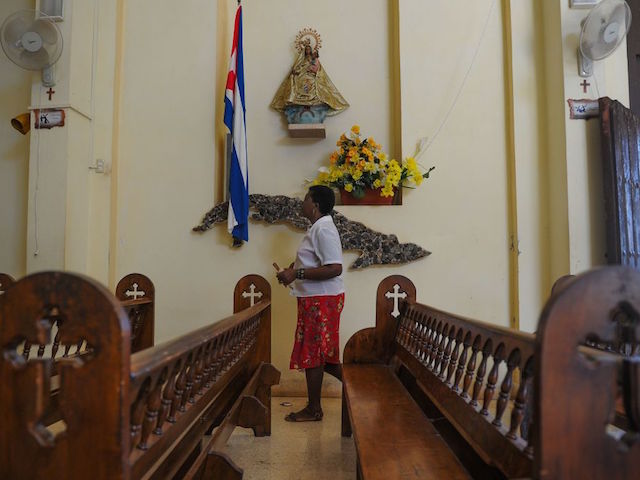Independent media confirmed the arrests of at least 5,000 people since protests against communism erupted in Cuba on Sunday, a total including those known to be under investigation but not the disappeared.
The human rights group Cuban Prisoners Defenders submitted a list of 162 people to the United Nations on Wednesday suspected of being the victims of forced disappearances, meaning their families have reported them missing, but police have not confirmed their arrest. Cuban police regularly detain individuals perceived to be opposed to the Communist Party for participating in peaceful protests, practicing journalism, or being involved with religious groups not controlled by the Party. The Cuban Observatory for Human Rights, a non-governmental organization, revealed in a report published this month that Cuba has enacted over 30,000 arbitrary arrests against perceived dissidents in the last five years.
Protests erupted in Cuba on Sunday calling for an end to the communist regime. The protests attracted thousands of people in nearly every major city in the country – spanning the entire island – and prompted Cuban police to respond by opening fire on protesters, beating them publicly, using attack dogs to maul them, and otherwise violently repressing them. President Miguel Díaz-Canel, who represents the public face of the Castro family regime, also called on civilians to violently attack protesters on the streets in an “order of combat” issued late Sunday.
The Cuban independent news outlet 14 y Medio reported on Wednesday that it could confirm, citing civil society organizations, “over 5,000 people imprisoned or under investigation” as a direct result of Sunday’s protests, among them a disproportionate number of journalists and pro-democracy activists. It noted that the regime’s internet shutdown made it much more difficult to communicate across the island, so there are likely a high number of others who participated in protests but remain incommunicado or whose relatives have not been able to reach journalists to report them missing.
Cuban citizens throughout the country have also expressed concerns over the potential deaths of their loved ones. Reports on social media suggest that hospitals are not allowing family members to visit patients in the hospital recovering from bullet wounds, leaving unclear their health status. The communist regime admitted to one death during the protests on Wednesday, a man identified as Diubis Laurencio Tejeda. Authorities did not reveal a cause of death in his case. The statement in which the Ministry of Interior revealed the death also accused protesters of attempting to attack a police station.
In addition to targeting journalists and members of known civil society groups, Cuban regime agents have assaulted and detained religious leaders. The most prominent case so far of such an assault occurred in Camagüey where Father Castor José Álvarez Devesa, a Catholic priest who had prominently criticized the regime, received a public beating before going missing for nearly 24 hours. Álvarez resurfaced late Monday after an international campaign demanding to know his whereabouts.
The United States Commission on International Religious Freedom (USCIRF) documented several other targeted attacks on religious leaders on the island in a statement on Tuesday.
“Those reported as detained include Yeremi Blanco and Yarian Sierra, two pastors from the Berean Baptist Mission in Matanza and Reverend Yusniel Pérez Montejo of the Eastern Baptist Convention,” USCIRF noted.
“Cuban authorities are detaining religious leaders merely for peacefully protesting and calling for greater respect for human rights,” USCIRF Commissioner James W. Carr said in a statement. “Principal among human rights concerns in Cuba are the ongoing and systematic violations of religious freedom, which include the persistent intimidation and harassment of religious leaders.”
The Global Liberty Alliance, a group that does extensive legal work to protect the faithful on the island, also shared reports on Tuesday that members of the Association of Free Yorubas of Cuba, or Free Yorubas, also went missing during the protests. The Yoruba are a Nigerian ethnic group; Cuban Yorubas are practitioners of a hybrid Cuban religion that blends Yoruba paganism with Spanish Catholicism known commonly as santería. The Cuban regime heavily regulates santería and persecutes those who practice it outside of the auspices of Party-approved priests.
The Global Liberty Alliance denounced on Tuesday that members of the Free Yorubas reported and outsized police presence outside of the residences of some of the most prominent members.
As of Wednesday, the Global Liberty Alliance also reported the disappearance of a Methodist pastor, Carlos Raúl Macías López, and his family.
While Christians on the island face significant persecution, the Vatican has not yet issued any substantive statement on the protests or the state violence in response to them as of Wednesday. Pope Francis has visited Cuba with the blessing of the Communist Party, receiving praise from Fidel Castro. Most Christians remaining in Cuba identify as Catholic.
The Conference of Catholic Bishops of Cuba issued a statement on Tuesday stopping short of condemning the government for the wave of violence it unleashed on its people.
“We understand that the government has responsibilities and has tried to take measures to improve the difficulties [faced by the country],” the statement read in part, “but we also understand that the people have a right to manifest their needs, desires, and hopes and, at the same time, publicly express how some measures taken are seriously affecting them.”
Follow Frances Martel on Facebook and Twitter.
